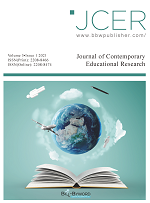Abstract
The expanding development of the world economy has triggered various approaches to address the impending environmental problems, among which documentary serves as one of the most effective and attractive ways to cultivate eco-harmony awareness. This article aims to probe how attitudinal resources are being distributed and what Sino-British ideologies have conveyed in the Chinese documentary, Wild China, and the British documentary, Climate Change: The Facts, under the framework of appraisal theory with the help of UAM CorpusTool 3.3. The results from this study indicate that Wild China tends to employ more dis/inclination resources to show that China is willful to collaborate with other countries for environmental protection. On the other hand, the United Kingdom (UK) tends to adopt dis/satisfaction resources to explicitly or implicitly convey their disagreement with the promotion of the economy under the cost of the environment. The appraisal resources employed by both documentaries convey the ideology of opposing humans’ over-exploitation of natural resources. The findings of this study have both theoretical and practical implications in enriching the application of appraisal theory on the analysis of ecological discourse and further encourage the world to take action in order to prevent the over-exploitation of natural resources.
References
Alexander RJ, Stibbe A, 2014, From the Analysis of Ecological Discourse to the Ecological Analysis of Discourse. Language Sciences, 41: 104-110.
Erica, Burman, 1992, Identification and Power in Feminist Therapy: A Reflexive History of a Discourse Analysis. Women’s Studies International Forum, 15(4); 487-498.
Browne DR, Keil R, 2000, Planning Ecology: The Discourse of Environmental Policy Making in Los Angeles. Organization & Environment, 13(2): 158-205.
Gerbig DG, Fenk CJ, Grooms SY, 2000, A Convenient and Highly Specific Western Blot Experiment for Introductory Biochemistry. Journal of Chemical Education, 77(3): 373.
Mufwene SS, 2017, Language Evolution from an Ecological Perspective, in Fill A, Penz H, (eds), The Routledge Handbook of Ecolinguistics, Routledge, London, 73-88.
Bang JC, Trampe W, 2014, Aspects of an Ecological Theory of Language. Language Sciences, 41: 83-92.
Martin JR, White PRR, 2005, The Language of Evaluation: Appraisal in English, Palgrave Macmillan, New York.
Sedlaczek AS, 2016, Representations of Climate Change in Documentary Television. Integrating an Ecolinguistic and Ecosemiotic Perspective into a Multimodal Critical Discourse Analysis, Language & Ecology, 24-26.
Agnes M, 2014, Flavors of Appraisal Theories of Emotion. Emotion Review, 6: 303-307.
Alexander RJ, 2017, Investigating Texts About Environmental Degradation Using Critical Discourse Analysis and Corpus Linguistic Techniques, in Fill A, Penz H, (eds), The Routledge Handbook of Ecolinguistics, Routledge, New York and London, 196-210.
Anné E, 2020, An Appraisal Theory Approach to News Reports on Rhino Poaching in South Africa. Language Matters, 1: 86-112.
Biber D, Finegan E, 1989, Styles of Stance in English: Lexical and Grammatical Marking of Evidentiality and Affect. Text – Interdisciplinary Journal for the Study of Discourse, 9(1).
Ellsworth PC, 2013, Appraisal Theory: Old and New Questions. Emotion Review, 5(2): 125-131.
Fuoli M, 2012, Assessing Social Responsibility: A Quantitative Analysis of Appraisal in BP’s and IKEA’s Social Reports. Discourse and Communication, 6(1): 55-81.
Gallardo S, Ferrari L, 2010, How Doctors View Their Health and Professional Practice: An Appraisal Analysis of Medical Discourse. Journal of Pragmatics, 42(12): 3172-3187.
Grundlingh L, 2018, Exploring the Possibility of Using Appraisal Theory to Determine the Legitimacy of Suicide Notes. Lingua, 214: 1-10.
Korenek P, Simko M, 2014, Sentiment Analysis on Microblog Utilizing Appraisal Theory. World Wide Web-Internet & Web Information Systems, 17(4): 847-867.
Martin JR, 2000, Beyond Exchange: Appraisal system in English: In Evaluation in Text. Oxford University Press, Oxford.
Painter C, 2003, Developing Attitude: An Onto-Genetic Perspective on Appraisal. Text, 23(2): 211-237.
Page R, 2003, An Analysis of Appraisal in Childbirth Narratives with Special Consideration of Gender and Storytelling Style. Text, 23(2): 211-237.
Roseman IJ, 2013, Appraisal in the Emotion System: Coherence in Strategies for Coping. Emotion Review, 5: 141-149.
Tavassoli F, Jalilifar A, White PRR, 2019, British Newspapers’ Stance towards the Syrian Refugee Crisis: An Appraisal Model Study. Discourse and Society, 30(1): 64-84.
Hu Z, 2009, The Appraisal Research of Discourse. Foreign Language Education, 30(1): 1-6.
Li Z, 2004, Appraisal Theory: Applications and Problems in Discourse Analysis. Foreign Language Research, 21(5): 1-6.
Liu S, Zhang Z, 2004, Structural Potential and Semantic Configuration of Appraisal. The Journal of Foreign Languages in China, 8(1): 22-27.
Ma W, 2007, The enlightenment of Appraisal Theory on oral English Teaching. Foreign Language Education, 28(6): 37-40.
Wang M, 2017, A Study on College English Majors’ Writings from the Perspective of Appraisal Theory. Theory and Practice in Language Studies, 7(1): 65-69.
Zhang M, 2002, The Appraisal Meaning of Languages and Value Orientation of Translators. Foreign Languages and Their Teaching, 18(7): 15-18.
